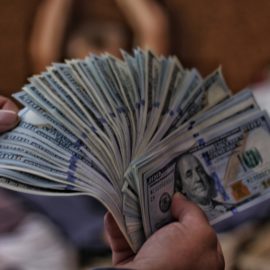

This article is an excerpt from the Shortform book guide to "The Millionaire Next Door" by Thomas J. Stanley and William D. Danko. Shortform has the world's best summaries and analyses of books you should be reading.
Like this article? Sign up for a free trial here .
What is economic outpatient care? Why is this type of help for adult children problematic?
Economic outpatient care is when an affluent parent bestows economic subsidies on a fully capable adult. The problem with economic outpatient care is that it trains the adult child to consume money rather than invest it to build wealth.
Read more about how economic outpatient care can actually hurt adult children.
Economic Outpatient Care Is Like Adult “Child Support”
Many millionaires give their adult children and grandchildren gifts—for instance, tuition or home purchases—as well as ongoing subsidies throughout their lives. The authors of the millionaire next door call this practice economic outpatient care.
While most millionaires accumulated their wealth over a lifetime by working hard, being frugal, and investing, they aren’t necessarily frugal in providing gifts and subsidies to their adult children and grandchildren. Nor do they always instill in their children the virtues that made them successful accumulators of wealth.
Research for this book shows that:
- Over 46% of millionaires give at least $15,000 a year to adult children or grandchildren under 35. (Givers reported giving more gifts in higher amounts than recipients reported receiving.)
- Nearly half of adult children of the wealthy get annual cash gifts
- One in five receives gifts in their forties or fifties
- As the parents age, they increase the number and size of gifts to reduce the estate tax after they die. Each parent can legally give $15,000 a year per child tax-free.
Among the purposes:
- 61% of millionaires have provided “forgiveness loans” (money loaned that wasn’t paid back)
- 59% substantially helped children buy a home (17% make mortgage payments)
- 45% have covered medical/dental expenses for adult children
- 43% of millionaires pay for all or part of their grandchildren’s private school tuition
- 17% provide stock every few years (their children often sell it for spending money)
Many wealthy parents think that giving adult children and grandchildren gifts and regular subsidies will help them get on their feet, after which further help won’t be needed. But this economic outpatient care tends to be ongoing for decades. As a result, millionaire parents who provide gifts and subsidies to children and grandchildren have significantly less wealth than others in their category whose children are independent.
How Economic Outpatient Care Affects Adult Children
Economic outpatient care enables children who are under-accumulators to live beyond their means and maintain a high-consumption lifestyle in which displaying status is the goal. UAWs’ children typically become UAWs as well because they grow up accustomed to this lifestyle.
Generally, the more economic outpatient care adult children receive, the less wealth they accumulate because they immediately spend rather than invest it. Cash gifts are habit-forming and discourage adult children from becoming independent. They find it easier to spend their parents’ money than to earn and accumulate their own.
Economic outpatient care recipients are less likely to accumulate wealth for several reasons:
1) Gifts lead to further consumption rather than saving and investing—for instance, a gift of a down payment on a house in an expensive neighborhood can trigger more spending to keep up with neighbors’ lifestyles and further dependence on parents.
2) Recipients feel entitled to spend their parents’ wealth (they don’t distinguish between their parents’ wealth and their own), yet see themselves as independent. Two-thirds of adult children who receive gifts or subsidies from wealthy parents believe they succeeded on their own.
3) Adult children who receive gifts run up significantly more credit than adult children who don’t get parental gifts. They use credit to fill cash flow gaps while waiting for gifts or an inheritance.
4) Gift recipients invest much less money than those who don’t receive gifts. Most gift recipients are spenders, so they have little to invest. Exceptions are adult children who are teachers and professors—they tend to live more modest lifestyles, and if they receive gifts, they’re more likely to invest them.
Creating a Cycle of Dependency
When millionaires have several children, the most financially successful child usually gets less of the parents’ wealth than the non-working or least productive sibling.
As children grow, wealthy parents tend to support the less capable child, while letting the independent sibling take care of herself. While this encourages the independent sibling, it increases the other’s dependency. It’s like when a child doesn’t learn because a parent does his homework.
When these indulged and underachieving children become adults, they’re UAWs who need subsidies to maintain an expensive lifestyle. The parents hope their gifts will turn these children into financially stable adults, but it doesn’t happen because they never learned discipline and resourcefulness as children.
Independent Adult Children
Some children of wealthy parents are quite successful. They differ from those who become UAWs in several ways:
- They usually don’t get cash gifts from their parents, yet they’re more likely to accumulate wealth than are subsidized adult children who spend all their money. They have a higher net worth and generate more income.
- Their parents instilled in them the values of frugality, discipline, and independence. They learn to take risks and overcome challenges.
Instead of giving cash gifts, wealthy parents can nurture productivity in their children by paying for their education, or providing modest help in starting a business, such as co-signing a small loan. They can also give adult children stock or other financial assets that can’t be easily converted to cash.
When children are young, wealthy parents can build their confidence and initiative, encouraging their involvement in sales—for instance, selling Girl Scout cookies or working in a retail store. Reward independence, responsibility, accomplishment, and leadership. Rather than trying to make children’s lives easier, more wealthy parents should teach them to stand on their own feet.

———End of Preview———
Like what you just read? Read the rest of the world's best book summary and analysis of Thomas J. Stanley and William D. Danko's "The Millionaire Next Door" at Shortform .
Here's what you'll find in our full The Millionaire Next Door summary :
- How and where most millionaires live
- Surprising characteristics and habits shared by many millionaires
- How you can become a millionaire over time if you have the determination






